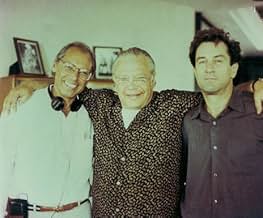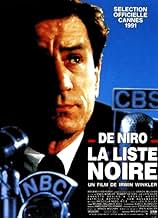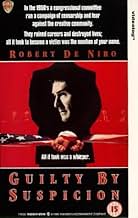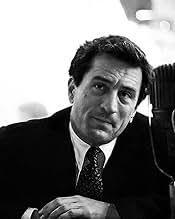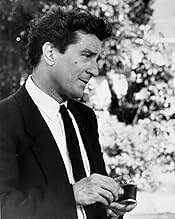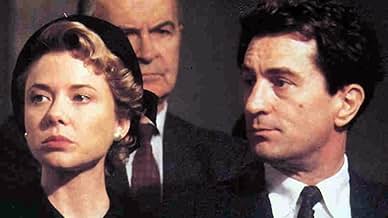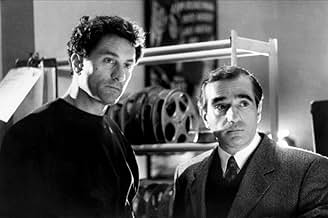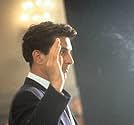1950 के दशक के आरंभ में हॉलीवुड में सेट, एक निर्देशक को कम्युनिस्ट सहानुभूतिकारियों की तलाश में मैककार्थसाइट समितियों की जांच का सामना करना पड़ता है. हालांकि उन्होंने अपने करियर को आगे बढ़ान... सभी पढ़ें1950 के दशक के आरंभ में हॉलीवुड में सेट, एक निर्देशक को कम्युनिस्ट सहानुभूतिकारियों की तलाश में मैककार्थसाइट समितियों की जांच का सामना करना पड़ता है. हालांकि उन्होंने अपने करियर को आगे बढ़ाने के लिए समझौता किया, लेकिन इसे बचाने के लिए उन्होंने अपने दोस्तों से समझौता नहीं किया. सम... सभी पढ़ें1950 के दशक के आरंभ में हॉलीवुड में सेट, एक निर्देशक को कम्युनिस्ट सहानुभूतिकारियों की तलाश में मैककार्थसाइट समितियों की जांच का सामना करना पड़ता है. हालांकि उन्होंने अपने करियर को आगे बढ़ाने के लिए समझौता किया, लेकिन इसे बचाने के लिए उन्होंने अपने दोस्तों से समझौता नहीं किया. समिति के साथ सहयोग करने से इंकार करने पर भयानक परिणाम सामने आते हैं.
- पुरस्कार
- 2 जीत और कुल 2 नामांकन
- Felicia Barron
- (as Roxann Biggs)
फ़ीचर्ड समीक्षाएं
This movie was originally to be based on the life of blacklisted writer/director Abraham Polonsky (Force of Evil, Body and Soul). Polonsky was working in France at the time of the HUAC hearings and a friend called to tell him not to come back or he'd be called to testify. He deliberately came back for the express purpose of telling HUAC where they could stick it. This is a good story as an anecdote, but not a great story for a movie.
The one place in which this movie (and many other movies) softens the history is by making the protagonist politically neutral. It is certainly true that many people accused were not communists or had only attended a meeting out of curiosity, but this is not true for everybody. Many of these people were devout socialists. As Polonsky has said on occasion "During the Great Depression, anybody with a brain considered Communism. The Capitalist system was BROKE. Communism looked like a smart bet." While many of these people reconsidered as the nation returned to prosperity, a large number did not.
Most of the famous Hollywood Ten were still believers in socialism when they were blacklisted. There is no evidence that any of them were spies for the Soviet Union-- many of them had already learned that the USSR was not the socialist paradise they dreamed of-- but they did believe in the writings of Mark and Engels. It is also true that they placed socialist themes in their films. They created gangsters who only cared about money, families screwed over by greedy real estate brokers and poor saps who put it all in the stock market.
However, none of this was illegal. They had every right to believe in whatever politics they chose to. They had every right to create these films-- and their movies seemed to have a resonance with the audience. They're lives and careers were destroyed because they held political beliefs that some viewed as threatening.
I also want to point out that Elia Kazan was not the model for this film. Elia Kazan has been repeatedly condemned by Polonsky and others who were blacklisted. He chose to name names and to allow the HUAC to bully him. I don't condemn him for this like other people. As this movie shows, so much was on the line for people who HUAC sets their sights on. Kazan cracked. He failed to be a hero, when the time came. This doesn't mark him a coward, merely something less than a hero. "On the Waterfront," while not a direct explanation of his actions, is an excellent look at his state of mind around that time.
While yes, I have not spent much time reviewing this movie, I felt it necessary to set the record straight about history.
The period of history around which this film is set is an interesting one and one that is worth knowing about as part of the whole "learning from history" ideal. However this is not the same as the film itself being good because unfortunately it is not what I would have liked. It relies too heavily on the informative nature of the recreation of the period rather than developing an interesting script with realistic characters. It doesn't help that the film tries to be all very serious and respectful but does rather fail and ends up coming over all earnest and self important. The script also tries not to really upset anyone who didn't take the moral stance of the fictional Merrill by just focusing on him even though it would have been a lot more interesting if it had had outrage, bitterness and realism at its heart.
Winkler directs without a great deal of style and his courtroom scene is average where it should have been the best scene of the film. De Niro works his material hard and makes for an engaging lead, however it is the lack of depth and complexity in his material that limits his performance. This is more or less true of the rest of the cast which, although starry, doesn't really provide anyone in particular with an opportunity to mark themselves out. Bening, Wendt, Wettig, Wanamaker, Sizemore, Scorsese, Cooper and others are good presences but not much more than that.
Overall then an interesting film in so much as it informs about an important period of history. However it is all very earnest and safe and lost a lot of potential for me. The cast is starry but the material is middle-of-the-road and didn't give anyone the complexity and outrage that the subject deserved.
The movie "Guilty by Suspicion" takes place in Hollywood during the height of the Second Red Scare. The movie focuses on David Merrill (Robert De Niro) though he is indicative of many Hollywood personnel affected by the Communist witch hunting.
David, by all indications, was a gainfully employed movie director that was in constant demand. He would have been able to stay gainfully employed so long as he told the F.B.I. what they wanted to hear. And they wanted to hear that certain friends of David's were Communists. David, valuing friendship over finances, opted to keep quiet about any of his friends activities. For that, David was put on the Hollywood blacklist.
"Guilty by Suspicion" is a weighty movie. We get an up close and personal look at what McCarthyism was doing to people's lives. Now I know that some of you may be saying, "Who cares? It was Hollywood." To that I would say that the Constitution never put zoning restrictions on who it applied to. The Constitution didn't have a Hollywood exemption in it and the U.S. government was trampling all over people's Constitutional rights. If they didn't have enemies within the U.S. they were certainly making them.
The story depicted in this film is not only perfectly representational of the black list era Hollywood, but is actually perfectly factual and accurate down to the small details. Reviewers should really do more research before "guessing" at what they just saw.
क्या आपको पता है
- ट्रिवियाMartin Scorsese portrays a fictional director called "Joe Lesser". This character is based on director Joseph Losey, who left Hollywood in the 1950s rather than face the HUAC examinations.
- गूफ़There is a Milwaukee Braves baseball pennant on the wall of Merrill's son's room. This film takes place in 1951 and 1952. The Braves didn't move to Milwaukee from Boston until 1953.
- भाव
David Merrill: [to the Blacklist Committee] Fuck them!
- साउंडट्रैकStraighten Up and Fly Right
Written by Nat 'King' Cole and Irving Mills
Performed by Nat 'King' Cole
Courtesy of Capitol Records, Inc.
By arrangement with CEMA Special Markets
टॉप पसंद
- How long is Guilty by Suspicion?Alexa द्वारा संचालित
विवरण
- रिलीज़ की तारीख़
- कंट्री ऑफ़ ओरिजिन
- भाषा
- इस रूप में भी जाना जाता है
- Culpable por sospecha
- फ़िल्माने की जगहें
- उत्पादन कंपनियां
- IMDbPro पर और कंपनी क्रेडिट देखें
बॉक्स ऑफ़िस
- बजट
- $1,30,00,000(अनुमानित)
- US और कनाडा में सकल
- $94,80,198
- US और कनाडा में पहले सप्ताह में कुल कमाई
- $22,78,290
- 17 मार्च 1991
- दुनिया भर में सकल
- $94,80,198
- चलने की अवधि
- 1 घं 45 मि(105 min)
- रंग
- ध्वनि मिश्रण
- पक्ष अनुपात
- 1.85 : 1


